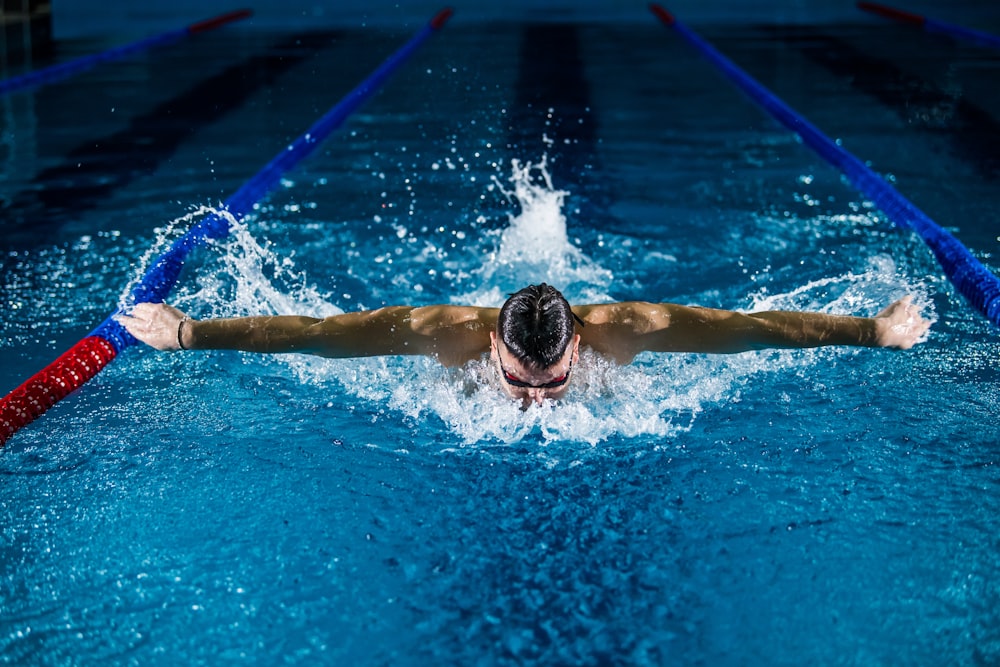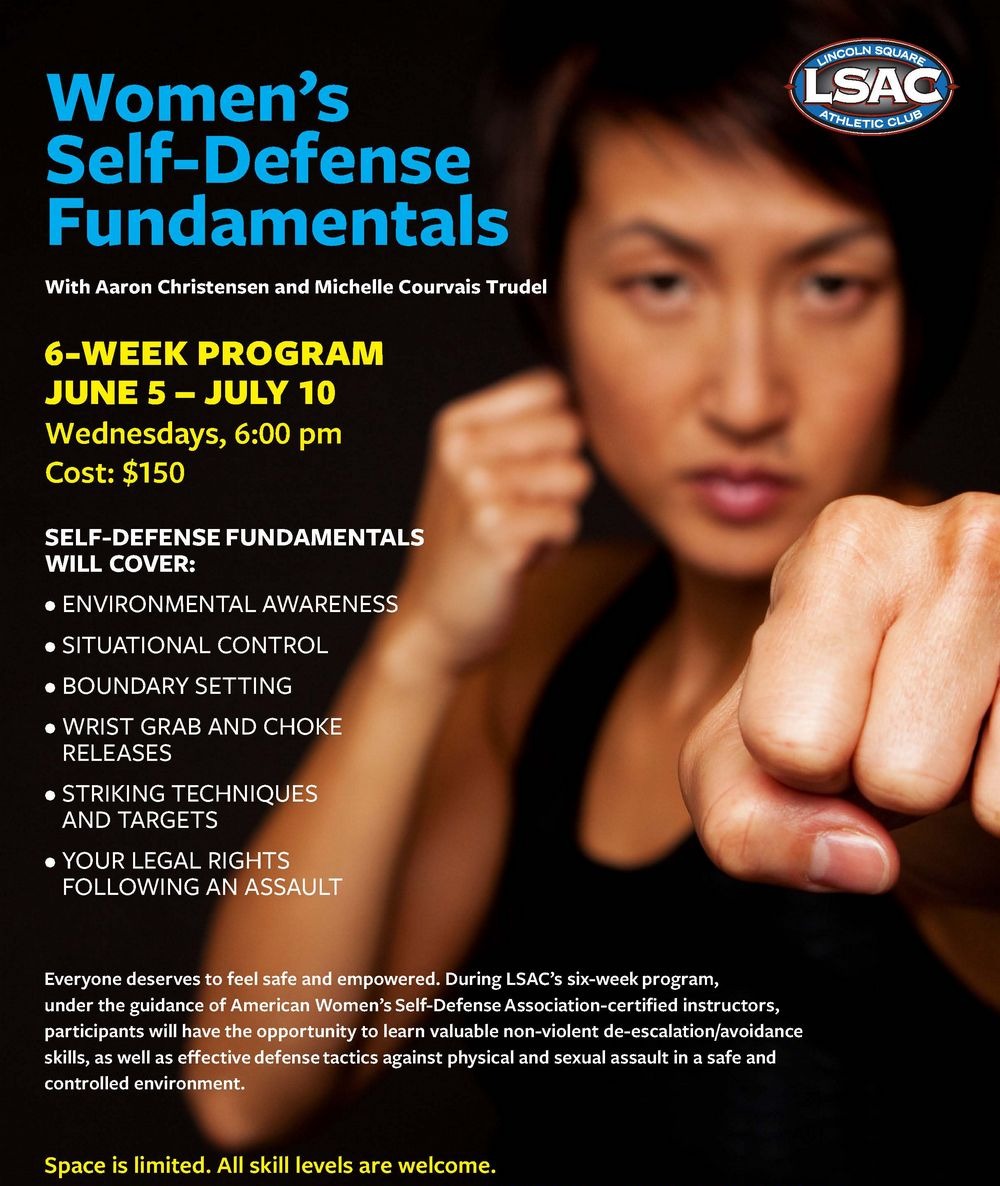MAKE A SPLASH
THIS SUMMER

Join Now For $0 Enrollment!
Learn MorePosted By: Chicago Athletic Clubs /
Part of overall health and well-being is feeling empowered in your own body. For women, this concept encompasses so much more than just training hard and eating well; it is also about feeling confident and safe in a world that may not always be friendly. Women’s self-defense classes in Chicago are a great way to build confidence, develop self-defense skills, and improve your personal safety in real-life encounters.
At Lincoln Square Athletic Club, the Women's Self-Defense Small Group Classes were created to introduce women in the Chicago area to simple yet powerful techniques that empower them in potentially dangerous situations.
This program began as a workshop and evolved into a 6-week series to allow women to practice and build on their skills. Our commitment is to offer inclusive fitness programs that address real-world needs.
Michelle Courvais Trudel and Aaron Christensen are the two trainers behind this program. Through this Q&A we dug deeper into the reasoning behind the program and how it benefits the women of Chicago Athletic Clubs and anyone who wants to participate in the class.
Why did you decide to offer this particular Small Group Training program?
MC: Pure and simple, because people asked for it. Every time we have done a 90-minute pop-up self-defense workshop at LSAC, people always ask for more of this training. The six-week format is incredibly helpful for students since they get the benefit of not only six hours worth of concepts and physical techniques, but they get the benefit of repetition.
AC: With the six-week format, participants have the chance to learn the techniques and come back week after week to practice them, really allowing time for the muscle memory to sink in. Instead of throwing two or three palm heel strikes or knee strikes, they are getting to throw 50-60 over the course of several weeks, with the memory recall time becoming shorter and shorter.
Why are you interested in teaching women's self-defense?
MC: Self-defense is not what many people think. I actually had a person ask me recently if teaching self-defense was about the proper use of pepper spray. I've also had people say that they feel they need to get into top shape before taking a self-defense class.
Neither of those things could be further from the truth, and I want people to understand that self-defense is not necessarily about weapons or being a trained fighter. Anyone can do it with a little training, and I feel like making it accessible at the gym is really important. This kind of training can be life-altering in so many positive ways.
AC: As a male-identifying member of society, I think it’s important that male allies stop patting themselves on the back for not being part of the problem (“Gee, aren’t I great for not harassing/assaulting women?”) and start becoming an active part of the solution.
I am a certified instructor with the American Women’s Self-Defense Association and a suited instructor with IMPACT Chicago, so this was an opportunity to bring elements of these different programs to my home club of LSAC.
Why is it particularly important for Women to learn self-defense?
MC: Well, it's no secret that we live in a culture that is, unfortunately, very comfortable with violence against women – it's so “normal,” it's almost expected. The statistics on violence against women are really appalling.
Women CAN defend themselves, but so many of us have been taught exactly the opposite! Attacking a woman should be dangerous. That is one of the ways to shift our culture, in my opinion. The more women hook into their own power, and the more men step up to say assaulting women is wrong (and walk their talk as allies), the safer we’ll all be to go about our lives.
AC: The first line of our class description reads: “Everyone deserves to feel safe and empowered.” Society’s concept of self-defense often conjures the image of beating up a group of bad guys in some dark alley like some scene out of an action movie, but the truth is much simpler.
It’s about people feeling safe moving through the world, knowing how to set verbal and physical boundaries early and often, and feeling confident in dealing with individuals who choose not to honor those boundaries.
As evidenced by the #MeToo movement, gender-based violence and harassment is a global problem; every empowered woman helps to create ripples in the pond. The reason men attack women is because they believe they can and there will not be consequences. We would like to make it a very dangerous proposition for any assailant to assault a woman.
Have you personally had experiences that required knowledge of self-defense?
MC: Yes, and I wish I knew back then some of the techniques we’re teaching now. I would have felt far more empowered to handle it.
What kind of knowledge can women who take this class expect to gain regarding self-defense?
MC: First, the reminder that women are inherently extremely powerful. And that there is a menu of choices for how we can defend ourselves, depending on how we assess a given situationwith situational awareness. One of the cornerstones of Empowerment Self-Defense is that each person has the choice to use a technique or not; the important thing is that each person has the skills to make that choice.
AC: What students may not be expecting is discovering the power of their voices and how they carry themselves.
In addition to teaching physical tactics in a safe and controlled environment, we teach environmental awareness (being conscious of your surroundings), projecting an attitude of confidence and alertness, establishing verbal and physical boundaries (both with strangers and acquaintances), and non-violent de-escalation/avoidance skills.
I think one of the important lessons we try to convey is that numerous elements of self-defense can be employed before an assailant puts his hands anywhere near you.
Is it also a workout class, or more focused on functional instructional training?
MC: The class is a combination of discussion and drilling of simple physical skills. It's enough of a workout that we do ask our participants to warm up their bodies. It qualifies as a full body workout, no doubt.
AC: It’s definitely a balance of both. You’ll get your heart rates up throwing knee strikes and front kicks to serve your fitness goals, but there’s also time spent deconstructing scenarios and conflict resolution. We discuss a technique, spend time drilling that technique, and then discuss where we might use said technique. Many participants use this class as a complement to other fitness programs.
What is the best way to keep practicing self-defense after the course ends?
MC: We encourage everyone to start some sort of related physical practice, whether it's hitting the heavy bag at LSAC, taking one of the weekly boxing classes, or considering a martial arts practice. We also encourage anyone who wants to brush up on their skills to come back to one of our pop-up workshops. (We also share a recommended reading list that just keeps growing; it’s never a bad thing to add to our learning by feeding our heads.)
AC: Much like physical fitness, self-defense is an ongoing lifestyle. Because the physical techniques are what we call “perishable skills,” i.e.” if you don’t use ’em you lose ’em.”
What are some things women can do each day to be more aware and better prepared to defend themselves in precarious situations or confrontations?
MC: Self-defense is a mental game. It starts with listening to our intuition and trusting that inner voice when it tells us that something is wrong. Your gut is usually right. First and foremost, trust yourself and adjust accordingly. It all begins with mindset. Awareness of your surroundings is a key aspect of daily self-defense.
Also, from a purely practical standpoint, I would say to keep one ear free when walking alone, and to consider what your body language is saying: are you alert and aware, and are you walking with a purpose? These things send a clear message and will also put you in the mindset of readiness. And yes, even something like attending kickboxing classes or strength sessions can enhance your alertness and readiness in subtle ways. Engaging in any physical activity regularly also builds the stamina you may need in an emergency.
AC: We talk about playing the “What if” game, i.e. “If I were to encounter a situation that felt a little strange, what would I do?”
It’s about feeling more comfortable and empowered walking down the street because you have the answers as to, “What would I do if…?” Something as simple as crossing the street to avoid a potential encounter or keeping your eyes up (off your phone) during your walk home can help make you less of a target.

| Alex Card
| Chicago Athletic Clubs
| Chicago Athletic Clubs
| Chicago Athletic Clubs
| Chicago Athletic Clubs
© 2026 Chicago Athletic Clubs. All Rights Reserved. Privacy PolicyEmployee Login
https://www.chicagoathleticclubs.com/
https://www.chicagoathleticclubs.com/services/personal-training/
0
5000
true